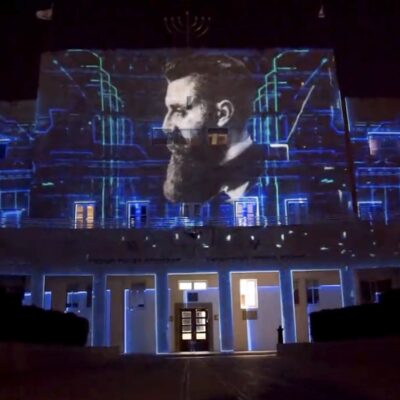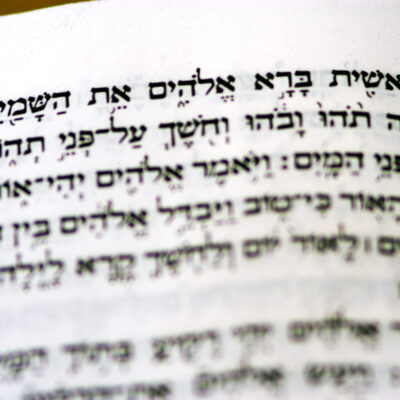Opinion
American values
Standing together for our democracy
Civil society – our vast network of voluntary associations, nonprofits, and philanthropies – has been central to our national identity since America’s founding. In this fertile ground, Jewish civil society has also flourished. From summer camps to film festivals, museums to social-service agencies, there are 7,500 Jewish institutions that promote and support rich, diverse Jewish life in this country.
Civil society is where we come together to pursue our values and interests; build relationships and power; solve problems; and practice what it means to be part of a diverse community that works out its differences through negotiation, deliberation, and compromise.

GETTY IMAGES
Because it plays these critical roles, civil society is especially vital in periods of national turmoil. It becomes all the more essential when trust in institutions is in decline and illiberal and authoritarian rhetoric and behavior are on the rise, making civil society a prime target of such forces. Civil society can act as a bulwark against the erosion of democratic values and can spur government and the broader polity to uphold their highest commitments. Doing so from a shared set of principles makes such efforts all the more powerful. As Dorothy Thompson, the first American journalist to be expelled from Nazi Germany, wrote, “Be sure you know what you’re prepared to defend.” That’s why more than 65 Jewish organizations have already signed on to a new set of Democracy Principles.
Throughout history — and in backsliding democracies around the world today — illiberal actors across the ideological spectrum have sought to suppress civil society organizations by restricting their ability to fulfill their missions. They erode freedom of speech by equating offensive speech with violence. They defame and disparage civil society organizations that don’t align with their political views, characterizing their activities as nefarious, illicit, and unpatriotic. They weaponize government institutions to harass and intimidate civil society into acquiescence. They threaten violence, retaliation, and retribution to quash dissent and demand loyalty.
Tactics like these are core to the authoritarian playbook employed by strongmen from the far right to the far left. They have featured prominently in moments of ascendant authoritarianism in the United States during the eras of Jim Crow and McCarthyism. And we needn’t look far to see how they have particularly targeted Jews and Jewish communities throughout history, from the blood libel to “The Protocols of the Elders of Zion” to the antisemitic overtones of attacks on philanthropist George Soros to the linking of Jews to the Great Replacement Theory. These are exactly the dynamics we’re seeing in our politics today.
These tactics have immediate impacts on their putative targets, but their indirect effects are far more insidious: They stoke fear, encouraging passivity and acquiescence; they inhibit collaboration (“Which partners are ‘safe’ and which might put me in someone’s crosshairs?”), reducing the participation and engagement that robust community life requires; and they undermine civil society’s capacity to take collective action to defend itself and democracy as a whole.
For Jews in this environment, with rising antisemitism and divisions among us, it’s all too easy for fear to take over, leading to insularity and a retreat from broader democratic participation and alliances. In these times we need to do the opposite: to strengthen the bonds of civil society across our community and with other communities.
There are myriad steps civil society organizations must take to protect themselves and their communities from illiberal threats and to uphold the democracy that makes their very existence possible. The first is to pledge to uphold to democratic principles before they are challenged by authoritarians. According to Keseb, an international, nonpartisan, pro-democracy nonprofit, the imperative is to “set a clear stance on pro-democratic principles internally and externally.”
Jewish organizations around the country have committed to such a set of Democracy Principles. These principles aren’t about any particular policy positions or ideological preferences, but instead proclaim a shared commitment to self-governance, core democratic rights and the rule of law. Together, they reaffirm the signatories’ shared commitment to upholding the foundational features and values of democratic society. By signing on, organizations commit to:
- Respect the rule of law and support and defend the fundamental American principle of equal justice under the law
- Defend the sacrosanct American rights to free speech, free expression, freedom of the press, freedom to assemble and free exercise of religion
- Honor fact-based deliberation and speak out against falsehoods that undermine respect for and confidence in our elections, the Constitution and the rule of law
- Support free, fair, safe and accessible elections; the right of all eligible voters to cast their votes and have them counted; and to honor the outcomes of those elections through the peaceful continuation or transfer of power
- Resolve differences within and beyond our community through respectful discussion and deliberation, to eschew dehumanization of our political opponents and to firmly reject political violence in all forms
- Hold government officials, political and civic leaders, and candidates for elected office responsible and accountable for all of the above
The Democracy Principles are designed to be embraced by the full range of Jewish civil society organizations – foundations, federations, synagogues and other nonprofits. There’s power and safety in numbers. The more organizations that sign on, the stronger our collective voice will be and the more we can do to protect our community and the other communities with whom we share this country. Make this commitment as if our safety, security and ability to thrive depend on them – because they do.
We’re at a tough moment in the history of the American democratic experiment, but we’ve survived tough moments before. If our civil society stays strong, connected and committed to democracy, there’s still so much this country – and the American Jewish community – can do, together.
Aaron Dorfman is founder and executive director of A More Perfect Union: The Jewish Partnership for Democracy, an effort to mobilize the Jewish community to protect and strengthen American democracy.
Justin Florence is managing director and co-founder of Protect Democracy.











